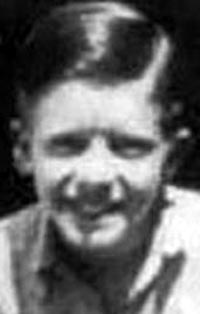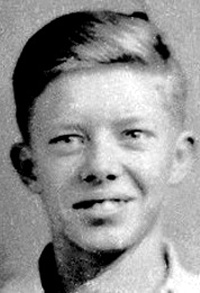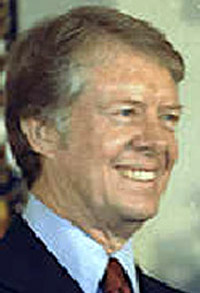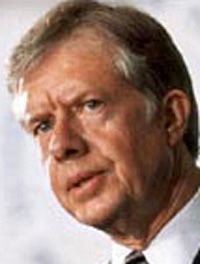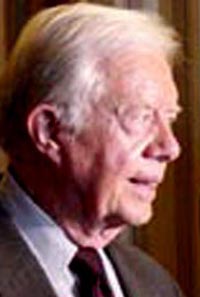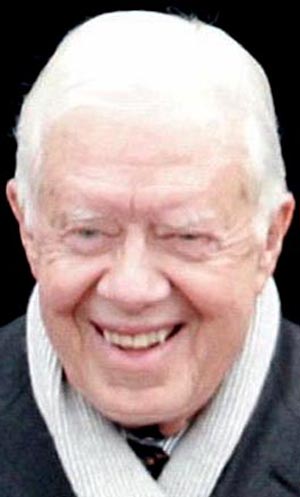Copyright Michael D. Robbins 2005
Astro-Rayological
Interpretation & Charts
Quotes
Biography
Images and Physiognomic Interpretations
A strong nation, like a strong person, can afford to be gentle, firm, thoughtful, and restrained. It can afford to extend a helping hand to others. It's a weak nation, like a weak person, that must behave with bluster and boasting and rashness and other signs of insecurity.
Aggression unopposed becomes a contagious disease.
America did not invent human rights. In a very real sense human rights invented America.
An act of terrorism totally outside the bounds of international law and diplomatic tradition. a crisis that calls for firmness and restraint.
For the first time in the history of our country the majority of our people believe that the next five years will be worse than the past five years.
For this generation, ours, life is nuclear survival, liberty is human rights, the pursuit of happiness is a planet whose resources are devoted to the physical and spiritual nourishment of its inhabitants.
Government is a contrivance of human wisdom to provide for human wants. People have the right to expect that these wants will be provided for by this wisdom.
Human rights is the soul of our foreign policy, because human rights is the very soul of our sense of nationhood.
I look forward to these confrontations with the press to kind of balance up the nice and pleasant things that come to me as president.
I've looked on many women with lust. I've committed adultery in my heart many times. God knows I will do this and forgives me.
If you fear making anyone mad, then you ultimately probe for the lowest common denominator of human achievement.
It is good to realize that if love and peace can prevail on earth, and if we can teach our children to honor nature's gifts, the joys and beauties of the outdoors will be here forever.
Like music and art, love of nature is a common language that can transcend political or social boundaries.
The experience of democracy is like the experience of life itself-always changing, infinite in its variety, sometimes turbulent and all the more valuable for having been tested by adversity.
There should be an honest attempt at the reconciliation of differences before resorting to combat.
To deal with individual human needs at the everyday level can be noble sometimes.
Unless both sides win, no agreement can be permanent.
We become not a melting pot but a beautiful mosaic. Different people, different beliefs, different yearnings, different hopes, different dreams.
We must adjust to changing times and still hold to unchanging principles.
We should live our lives as though Christ were coming this afternoon.
We will not learn to live together in peace by killing each other's children.
Whatever starts in California unfortunately has an inclination to spread.
Wherever life takes us, there are always moments of wonder.
You can do what you have to do, and sometimes you can do it even better than you think you can.
You can't divorce religious belief and public service I've never detected any conflict between God's will and my political duty. If you violate one, you violate the other.
Jimmy Carter aspired to make Government "competent and compassionate," responsive to the American people and their expectations. His achievements were notable, but in an era of rising energy costs, mounting inflation, and continuing tensions, it was impossible for his administration to meet these high expectations.
Carter, who has rarely used his full name--James Earl Carter, Jr.--was born October 1, 1924, in Plains, Georgia. Peanut farming, talk of politics, and devotion to the Baptist faith were mainstays of his upbringing. Upon graduation in 1946 from the Naval Academy in Annapolis, Maryland, Carter married Rosalynn Smith. The Carters have three sons, John William (Jack), James Earl III (Chip), Donnel Jeffrey (Jeff), and a daughter, Amy Lynn.
After seven years' service as a naval officer, Carter returned to Plains. In 1962 he entered state politics, and eight years later he was elected Governor of Georgia. Among the new young southern governors, he attracted attention by emphasizing ecology, efficiency in government, and the removal of racial barriers.
Carter announced his candidacy for President in December 1974 and began a two-year campaign that gradually gained momentum. At the Democratic Convention, he was nominated on the first ballot. He chose Senator Walter F. Mondale of Minnesota as his running mate. Carter campaigned hard against President Gerald R. Ford, debating with him three times. Carter won by 297 electoral votes to 241 for Ford.
Carter worked hard to combat the continuing economic woes of inflation and unemployment. By the end of his administration, he could claim an increase of nearly eight million jobs and a decrease in the budget deficit, measured in percentage of the gross national product. Unfortunately, inflation and interest rates were at near record highs, and efforts to reduce them caused a short recession.
Carter could point to a number of achievements in domestic affairs. He dealt with the energy shortage by establishing a national energy policy and by decontrolling domestic petroleum prices to stimulate production. He prompted Government efficiency through civil service reform and proceeded with deregulation of the trucking and airline industries. He sought to improve the environment. His expansion of the national park system included protection of 103 million acres of Alaskan lands. To increase human and social services, he created the Department of Education, bolstered the Social Security system, and appointed record numbers of women, blacks, and Hispanics to Government jobs.
In foreign affairs, Carter set his own style. His championing of human rights was coldly received by the Soviet Union and some other nations. In the Middle East, through the Camp David agreement of 1978, he helped bring amity between Egypt and Israel. He succeeded in obtaining ratification of the Panama Canal treaties. Building upon the work of predecessors, he established full diplomatic relations with the People's Republic of China and completed negotiation of the SALT II nuclear limitation treaty with the Soviet Union.
There were serious setbacks, however. The Soviet invasion of Afghanistan caused the suspension of plans for ratification of the SALT II pact. The seizure as hostages of the U. S. embassy staff in Iran dominated the news during the last 14 months of the administration. The consequences of Iran's holding Americans captive, together with continuing inflation at home, contributed to Carter's defeat in 1980. Even then, he continued the difficult negotiations over the hostages. Iran finally released the 52 Americans the same day Carter left office.
James Earl Carter, Jr. (born October 1, 1924) was the 39th (1977-1981) President of the United States. Since leaving office, he has been active in international public policy and conflict resolution. He is also an author. He won the 2002 Nobel Peace Prize.
Carter was born in the town of Plains, Georgia, to James Earl Carter and Bessie Lillian Gordy. He was the first president born in a hospital. He grew up in nearby Archery. He attended Georgia Southwestern College and the Georgia Institute of Technology, and received a B.S. degree from the United States Naval Academy in 1946, the same year he married Rosalynn Smith. He served on submarines in the Atlantic and Pacific fleets, and was later selected by Admiral Hyman Rickover for the U.S. Navy's nuclear submarine program. Upon the death of his father in 1953, he resigned from the Navy and established a peanut farming business in Plains. From a young age, Carter showed a deep committment to Christianity, serving as a Sunday School teacher throughout his political career.
Early political career
Carter started his career by serving on the Plains school board. In the 1960s he served two terms in the Georgia State Senate.
In his 1970 campaign Carter was elected governor on a pro-George Wallace platform. Carter's campaign aides handed out thousands of photographs of his opponent, the liberal former Gov. Carl Sanders, showing Sanders associating with black basketball players. On the stump, Carter pledged to reappoint an avowed segregationist to the state Board of Regents. He promised as his first act to invite former Alabama Gov. George Wallace into the state to speak. Old-line segregationists across the state endorsed Carter for governor.But following his election, Carter said in speeches that the time of racial segregation was over, and that racial discrimination had no place in the future of the state. He was the first white southern politician to say this in public (such sentiments would have signaled the end of the political career of white politicians in the region less than 15 years earlier), so his victory attracted some attention as a sign of changing times. Carter served as governor of the state of Georgia from 1971 to 1975 but failed in his re-election bid, having alienated both the voters and the state legislature through what has been described as an imperial style of governing.
When Carter entered the Democratic Party Presidential primaries in 1976 he at first was considered to have little chance against nationally better-known politicians. However the Watergate scandal was still fresh in the voters' minds, so his position as an outsider distant from Washington, DC became an asset. He ran an effective campaign, did well in debates, and won his party's nomination and then the election. Government reorganization was the centerpiece of his campaign platform. He was the first candidate from the Deep South to be elected president since the American Civil War.
Presidency
As part of his government reorganization efforts, Carter separated the Department of Health, Education and Welfare (HEW) into the Department of Education and the Department of Health and Human Services. He also elevated the Energy agency into a new cabinet-level department, the United States Department of Energy.The Carter Administration's foreign policy is best remembered for the peace treaty he brokered between the states of Israel and Egypt with the Camp David Accord, the SALT II treaty brokered with the Soviet Union, the Panama Canal treaty which turned the canal over to Panama, and an energy crisis. He was much less successful on the domestic front, having alienated both his own party and his opponents through what was perceived as a lack of willingness to work with Congress — much as he had in his term as Governor.
On July 15, 1979, Carter gave a nationally televised address in which he identified what he believed to be a crisis of confidence among the American people. This has come to be known as his "malaise" speech, even though he never actually used the word "malaise" anywhere in the text:
I want to talk to you right now about a fundamental threat to American democracy.... I do not refer to the outward strength of America, a nation that is at peace tonight everywhere in the world, with unmatched economic power and military might.
The threat is nearly invisible in ordinary ways. It is a crisis of confidence. It is a crisis that strikes at the very heart and soul and spirit of our national will. We can see this crisis in the growing doubt about the meaning of our own lives and in the loss of a unity of purpose for our nation.Carter's speech, or rather sermon, was well-received. The country was in the worst recession since the 1930s, with inflation and unemployment at record levels. But the people who had hoped for more inspiring leadership were disappointed. Two days after the speech, Carter asked for the resignations of all of his Cabinet officers, and ultimately accepted five. With no visible efforts towards a way out of the malaise, Carter's poll numbers dropped even further.
Among Presidents who served at least one full term, Carter is the only one who never made an appointment to the Supreme Court.
Foreign policies
Carter promoted his foreign policy as being one that would place human rights at the forefront. This was intended to be a break from the policies of the Nixon administration, in which human rights abuses were often overlooked if they were committed by a nation that was allied to the United States. The Carter administration ended support to the historically U.S.-backed Somoza dictatorship in Nicaragua, and gave millions of dollars in aide to the nation's new regime, following a pro-democracy coup.
The main conflict between human rights and U.S. interests came in Carter's dealings with the Shah of Iran. The Shah had been a strong ally of America since World War II, and was one of the few U.S.-friendly regimes in the Middle East. However, his rule was strongly autocratic. Though Carter praised the Shah as a wise and valuable leader, when a popular uprising against the monarchy broke out in Iran, the Carter administration did not intervene.
The Shah was deposed and exiled. Many have since connected the Shah's dwindling U.S. support as a leading cause of his quick overthrow. Carter was initially prepared to recognize the revolutionary government of the monarch's successor, but his efforts proved futile.
In 1979, Carter reluctantly allowed the deposed Shah, Mohammad Reza Pahlavi into the United States for political asylum and medical treatment. In response to the Shah's entry into the U.S., Iranian militants seized the American embassy in Tehran taking 52 Americans hostage and demanded the Shah's return to Iran for trial and execution. Though later that year the Shah would leave the US and die in Egypt, the Iran hostage crisis continued, and dominated the last year of Carter's presidency. The subsequent responses to the crisis, from a "Rose Garden strategy" of staying inside the White House, to the botched attempt to rescue the hostages, were largely seen as contributing to defeat in the 1980 election.
Although the Carter team had pursued the release of the hostages, an agreement for their release was not signed until January 19, 1981, after the election of Ronald Reagan. In what many observers have seen as a slight against Carter, the Iranians waited to release the captives until minutes after Reagan was sworn-in as president. The hostages had been held captive for 444 days.
The Soviet invasion of Afghanistan in December 1979 was a response to the U.S. military presence there, according to Carter's National Security advisor Zbigniew Brzezinski. After the invasion, Carter announced the Carter Doctrine, according to which the U.S. would not allow any outside power to gain control of the Persian Gulf. Also in response to the events in Afghanistan, Carter prohibited Americans from participating in the 1980 Summer Olympics, which were held in Moscow, and he reinstated registration for the draft for young males.
In order to oppose the Soviet occupation of Afghanistan, Carter and Zbigniew Brzezinski started a $40 billion program of training Islamic fundamentalists in Pakistan and Afghanistan. In retrospect, this contributed to the collapse of the Soviet Union, but, ironically, is also often tied to the resulting instability of post-Soviet Afghani governments, which led to the rise of Islamic theocracy in the region. Some even tie the program to the 1996 coup that established the Taliban regime in Afghanistan and to the creation of violent Islamic terrorist groups. At the time, and perhaps continuing into the Reagan and G.H.W. Bush presidencies, Islamic fundamentalism as a political force was not well understood.
Controversies
Members of the Reagan-Bush campaign and administration (most notably Barbara Honegger, in her book October Surprise), and the president of Iran in 1980 (Abu Al-Hasan Bani-Sadr, My Turn to Speak: Iran, the Revolution and Secret Deals With the U.S.) have alleged that a secret agreement between the Reagan campaign (orchestrated by George H. W. Bush) was responsible for destroying a deal between the Carter administration and the Iranian government that would have had the hostages released in October 1980. Such a scenario was termed "The October Surprise" by the Reagan team. Unnamed sources also are alleged to have claimed that it was blackmail over the deal that led to the U.S. involvement in the later Iran-Contra scandal, as Iran demanded to be sold weapons to use in its war against Iraq if the Reagan administration wanted it to keep quiet. It should be noted that none of these allegations has been proven or even officially investigated by any governmental body.
During Carter's administration, diplomatic recognition was switched from the Republic of China to the People's Republic of China, a policy continued into the 21st century. In response, Congress passed the Taiwan Relations Act.
Carter has been accused of ordering a cover-up of the events at Three Mile Island following the near meltdown of that nuclear plant. He has also been criticized for not doing enough to promote his stated human rights foreign policy stance in his administration, such as continuing to support the Indonesian government even while it was implicated in the commission of acts of genocide in the occupation of East Timor.
Post-Presidency
Since losing his bid for re-election, Carter has been involved in a variety of public policy, human rights, and charitable causes. His work in international public policy and conflict resolution is largely through the Carter Center. The center also focuses on world-wide health care including the campaign to eliminate guinea worm disease.He and members of the center are sometimes involved in the monitoring of the electoral process in support of free and fair elections. This includes acting as election observers, particularly in Latin America and Africa.
Because he had served as a submariner (the only President to have done so), a submarine was named for him. The USS Jimmy Carter (SSN-23) was named on April 27, 1998, making it one of the very few US Navy vessels to be named for a person still alive at the time of the naming.
Carter visited Cuba in May 2002 meeting with Fidel Castro and becoming the first President of the United States, in or out of office, to visit the island since Castro's 1959 revolution.
Not all Carter's efforts have gained him favor in Washington; President Clinton and both Presidents George H.W and George W. Bush were said to have been less than pleased with Carter's "freelance" diplomacy in Iraq and elsewhere.
Carter was awarded the Nobel Peace Prize in 2002 for his decades of untiring effort to find peaceful solutions to international conflicts, to advance democracy and human rights, and to promote economic and social development. He was the third U.S. president, after Theodore Roosevelt and Woodrow Wilson, to receive the award.
In March 2004 Carter roundly condemned George W. Bush and Tony Blair for waging an unnecessary war "based upon lies and misinterpretations" in order to oust Saddam Hussein. He claimed that Blair had allowed his better judgement to be swayed by Bush's desire to finish a war that his father had started.
He and his wife Rosalynn are also well-known for their work with Habitat for Humanity.

